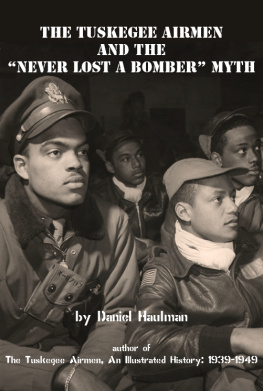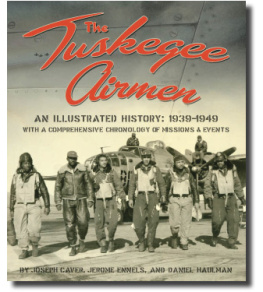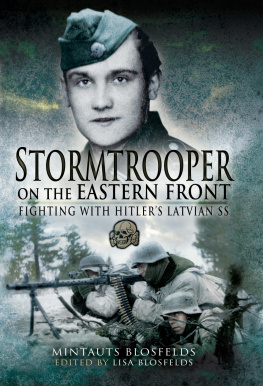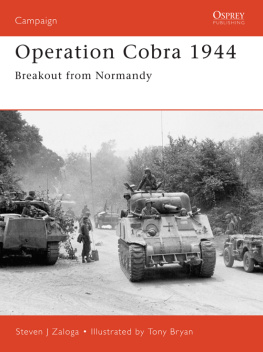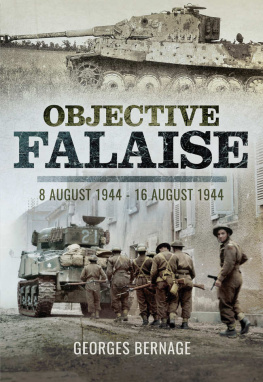Daniel L. Haulman's article "The Tuskegee Airmen and the 'Never Lost a Bomber Myth'" originally appeared in the January 2011 issue of The Alabama Review (Volume 64, Number 1, pages 3060). Copyright 2011 Alabama Historical Association. Used by permission. May not be copied for distribution without permission of copyright holder.
Visit www.newsouthbooks.com.
The Tuskegee Airmen and the
Never Lost a Bomber Myth
Daniel L. Haulman
For sixty years after World War II, the Tuskegee Airmens 332nd Fighter Group was reputed to be the only American fighter escort group to have never lost a bomber to enemy aircraft. Where did the claim originate, and was it true?
On March 10, 1945, the respected and widely read Liberty magazine published Dark Angels of Doom, an article by influential black journalist Roi Ottley about the 332nd Fighter Group in combat. Ottley wrote that in more than 100 combat missions in which the Red Tails have given escort cover to their Big Friendsthe long-range heavy bombersthey havent lost a single ship to enemy fighters! By then the 332nd had flown more than 130 bomber escort missions, and had lost bombers on only six of those missions. But the group did not fly 100 missions before losing a bomber. In fact, the group lost bombers during its first few missions. Nevertheless, readers might have falsely concluded that the group had flown more than 100 bomber escort missions without losing a bomber, when in fact it had lost bombers on at least six of more than 130 escort missions flown by March 10, 1945.
By March 1945, the 332nd had flown more than 200 missions for the Fifteenth Air Force, including strafing attacks on ground targets and fighter sweeps as well as bomber escort missions. On March 24, 1945, the Chicago Defender , a prominent African American newspaper, published another article entitled 332d Flies Its 200th Mission Without Loss. Apparently the reporter had misinterpreted the Ottley article, which had been published two weeks before, and expanded it into a larger myth that the Tuskegee Airmen did not lose a bomber after 200 bomber escort missions. In fact, the 332nd flew a total of only 179 bomber escort missions out of a total of 311 missions for the Fifteenth Air Force.
The never lost a bomber claim already circulated before a War Department press release dated June 21, 1945, announced that Col. Benjamin O. Davis Jr., who had commanded the 332nd, was taking command of the 477th Bombardment Group. Based on the preceding newspaper article, the press release claimed that on February 28, 1945, Colonel Davis group had completed 200 missions with the 15th Air Force and had served as escort to heavy bombers without losing a single bomber to enemy fighters. This was probably the first time an official Air Force document repeated the never lost a bomber claim.
Charles Francis wrote the first book about the Tuskegee Airmen in 1955. While he discussed the excellent combat record of the 332nd Fighter Group and its squadrons, he did not repeat the never lost a bomber claim. The statement eventually appeared in countless other places, including books, magazines, newspaper articles, television documentaries, and museum displays about the Tuskegee Airmen. By the end of the twentieth century, many found it difficult to think of the black pilots without also thinking they had never lost a bomber.
Davis, who later rose to become the first African American general in the United States Air Force, commanded the 332nd during most of the time it served in combat with the Fifteenth Air Force. His father had been the first African American general in the United States Army. As a lieutenant general, the younger Davis shared his experiences with historian Alan Gropman in a 1990 oral history interview. Gropman asked Davis specifically about the never lost a bomber claim. Davis replied, I do not say that, or if I do say it, its not an over-enthusiastic statement. I question that privately between you and me. But so many people have said it that a lot of people have come to believe it.
Davis himself might have come to believe it. The very next year, 1991, the Smithsonian Institution published Daviss autobiography entitled Benjamin O. Davis, Jr., American . In that book he noted: in a letter of commendation to me, Buck Taylor remarked that ours was a fine military organization: among our accomplishments, we had achieved the distinction of never losing a single bomber to enemy fighters on an escort mission. Davis himself, despite questioning the statement the year before, endorsed the claim.
In 1995 the cable television channel HBO broadcast a movie called The Tuskegee Airmen that reached a national audience more effectively than almost any other medium. The movie repeated the never lost a bomber statement, reinforcing the common belief that the 332nd was the only fighter group never to have lost a bomber under its escort.
Apparently no one seriously or publicly questioned the veracity of the never lost a bomber statement in the twentieth century, possibly because the claim was so old, and possibly because it had been repeated so often. In 1997 members of the Tuskegee Airmen Inc., which included many of the original Tuskegee Airmen veterans, chose William Holton, an African American US Navy veteran of World War II, to be the organizations national historian. When a World War II veteran told Holton he did not believe the never lost a bomber statement, Holton began research to prove it was true. What he found instead was evidence among the daily mission reports of the 332nd that bombers might have been shot down by enemy aircraft after all. In 2004 Holton published a booklet to celebrate the sixtieth anniversary of the groups first heavy bomber escort missions in World War II. The Holloman committee explored the documents in an attempt to prove or disprove Holtons assertion that the never lost a bomber statement was false.
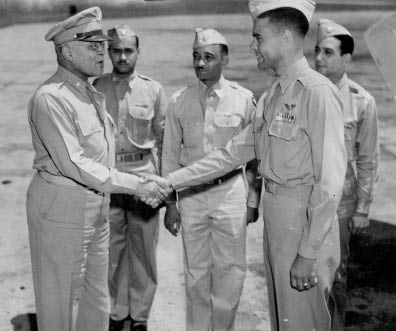
Benjamin O. Davis Sr. greeting Benjamin O. Davis Jr. during an inspection.
Image courtesy of the Tuskegee Airmen Photographic Collection, Air Force Historical Research Agency,
Maxwell Air Force Base.
In 2006 the author, a historian at the Air Force Historical Research Agency, Maxwell Air Force Base, since the 1980s, wrote an article about the aerial victory credits of the Tuskegee Airmen originally called 109 Victories. I was not aware of Holtons previous research and examined some of the same mission reports of the 332nd Fighter Group, and I came to the same conclusion that the never lost a bomber statement was false. I mentioned that discovery at the spring 2006 symposium of the Society for Military History at Kansas State University.
When I returned from the meeting, Joseph Caver, an archivist who also works at the Air Force Historical Research Agency, informed me of William Holtons research and that Holton had already discovered that the never lost a bomber claim was false. In fact, Caver had been at the 2004 meeting of the Tuskegee Airmen Inc. when Holton presented his original findings.
In December 2006 a reporter named Alvin Benn interviewed me about my research that suggested the famous never lost a bomber statement was historically inaccurate. During the interview I told Benn about Holtons similar research, and he also interviewed Holton. On December 10 he published an article in the Montgomery Advertiser titled Tuskegee Airmens Record Disputed. Later in December several reporters interviewed both me and Holton about our research and our questioning of the never lost a bomber claim became widely known.

